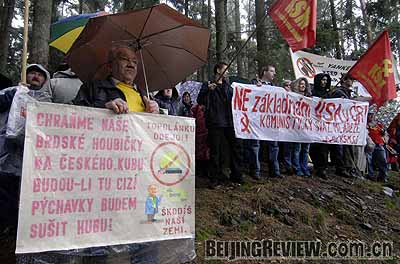|
The United States withdrew from the ABM Treaty after Bush took power in 2001. It set about investing heavily in an integrated anti-missile system and expanding global cooperation in the research and deployment of the anti-missile system. Against this backdrop, Russia accelerated its research and deployment of new types of land-based and sea-based nuclear strategic missiles. It also secretly developed RS-24, a thermonuclear intercontinental ballistic missile, and tested it twice in 2007 and 2008, respectively.
Putin has said on many occasions that Russia is already in possession of a strategic nuclear missile that can penetrate any defense system. But no details about the missile's code and technology are available to the public. There is reason to believe that a more plausible scenario could be that Russia has not gone that far due to budget limits and technological difficulties. Russia successfully tested a new reentry vehicle with its SS-25 or SS-19 missiles in a large military exercise in 2004. To date, no media reports have been made on the deployment of this new type of strategic warhead.

NO U.S. PRESENCE: Czechs in Misov in the central west of the country hold a protest on April 19 to oppose the U.S. plan to install a missile defense radar base in their town
As part of their nuclear arms race, the U.S.-Russia contention over missile defense exhibited different features in different periods. During the Cold War when there was a balance of nuclear forces, the two nations could contract bilateral agreements or treaties on the development and deployment of strategic nuclear forces and anti-missile systems and barely risked installing strategic weapons and equipment close to the other's border. This was illustrated by the Cuban Missile Crisis in 1962, when Russia was forced to dismantle its missiles in Cuba. Today, however, with indisputable strategic advantages, the United States is reluctant to enter into any agreements or treaties with Russia for fear of accompanying constraints that might preclude it from developing and deploying nuclear forces and anti-missile systems at its own will.
Seeking a way out
In recent years, Russia already has been cornered by an expanded NATO, imbalanced strategic nuclear forces, and the fast development of the U.S. anti-missile technology and space-based weapons. The present move of the United States to deploy the system in Eastern Europe has dealt another blow to Russia, which has suffered from shrinking strategic sphere of influence.
Indeed, the deployment of an anti-missile system in Eastern Europe cannot be described as large-scale by any means at the present stage, but this could be just the tip of the iceberg. More forces and a strengthened anti-missile system from the United States are expected if needs arise. Russia is even going so far as to believe that the United States may deploy strategic offensive weapons in its Eastern European base in future.
Despite Washington's repeated claims that its missile deployment in Eastern Europe aims to deal with threats from Iran, everybody knows that Iran will not be able to pose any serious threats to the United States with its ballistic missile capabilities in the foreseeable future.
The United States always makes justifications for its military plans before it takes action, as evidenced by the wars in Kosovo and Iraq. Given this factor, people may hardly be convinced that Washington's main purpose is to address the threats of Iran's ballistic missiles, although deterring Iran could be part of its agenda.
| 